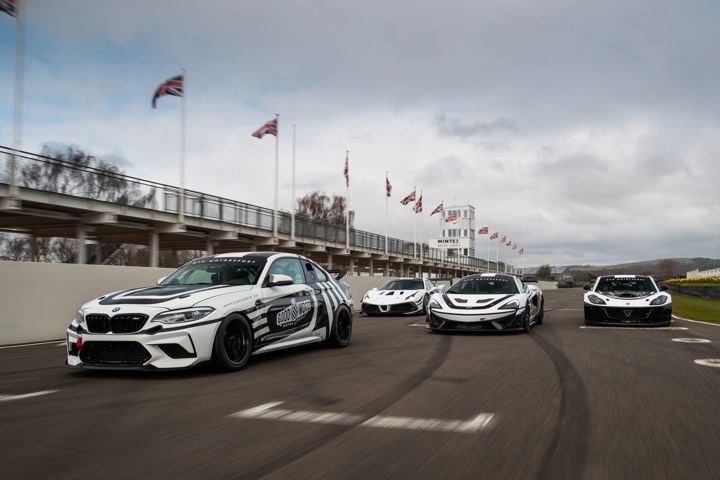How one man turned the Porsche 911 from gentleman GT to thoroughbred racer
It’s remarkable to consider given the subsequent 50-plus years that the most successful GT was not conceived and built with competition in mind: no budget, no works team, no spares – Porsches don’t break down! – and put plainly very little interest.

Yet Elford had not only seen something in its “gentleman’s luxury tourer” that Porsche – despite Günther Klass’s Group 3 European rally title – had not, but also he was prepared to back his hunch: his Tour of Corsica of November 1966 was to be undertaken with a standard 911 cajoled from comps boss Huschke von Hanstein plus a spartan service van crewed by a couple of mechanics – and entirely at his own financial risk.
Elford finished this 24-hour ‘Rally of 10,000 Corners’ in third place and entirely convinced of 911’s fundamental suitability and untapped potential. In his educated, sympathetic hands this reputed “oversteering monster” was blessed with godsend adaptability and manoeuvrability.
“Basically it was an understeerer,” he says in contradiction of the canon. “What people were doing wrong is what most people do wrong, most of the time, in any car: turn into a corner and lift off.
“I started in Corsica with the idea that, ‘I know nothing about this car. Let’s see what happens.’ So I was driving very smoothly, quietly and cautiously, getting quicker and quicker, and in so doing discovered that it’s a pure understeering car.
“If you start to turn the wheel, then lift off, you put more weight on the front wheels, which are already turned, while taking weight off the back. And at that point, yeah, 911’s going to oversteer. Like a pig.
“But if you are going along a straight road and take your foot off the throttle, then start to turn the wheel, it wants to go straight on. You’ve added that little bit of weight to the front but it doesn’t matter because at that point all the wheels are nicely, properly balanced. The car will start to turn – but it will understeer.
“I could make it oversteer of course. On a slippery surface I would, say, approaching a left-hand hairpin make it oversteer violently to the right and arrive sideways. Catching the skid before it got out of control I could get around the corner in a spinning motion without actually steering.
“Normally though I would start with slight understeer on the way into a corner and at any time could convert that into a touch or a lot of oversteer without losing momentum, with a slight lift of the throttle.”
Porsche’s interest had been piqued – Elford noticed the change of atmosphere on his next visit to Stuttgart – but any contract for 1967 would still have to be on an event-by-event basis. He jumped at it.
And at that point, yeah, 911’s going to oversteer. Like a pig.
Vic Elford
He would have won the Monte in a 911S had he and co-driver David Stone not been caught in a blizzard on racing tyres on the last run over the Turini – they slithered and slipped to third – and matters snowballed from there.
Elford won February’s inaugural televised Lydden Hill rallycross in a demonstrator borrowed from UK importers AFN – its shock at the panel damage accrued assuaged by the sudden influx of impressed potential buyers – and that same GVB 911D was sent to Germany and returned a British Saloon Car Championship contender thanks to its 2+2 cabin and the application of relaxed Group 5 regulations.
But rallying remained the priority for now and Elford set about maximising 911’s advantages, particularly those contained within its five-speed transmission: a choice of 43 homologated ratios multiplied by three final drives: “I was able to ‘design’ my own gearboxes.”
The Lyon-Charbonnières Rally in March was won using a 165mph top speed – selected because the opening race on the Solitude circuit near Stuttgart accounted for approximately 40 per cent of the final result – while April’s Tulip Rally in the Alps was won using “rocket” acceleration engendered by a 100mph maximum.
“I was learning lots about the car,” says Elford. “Mine was being built by Hermann Briem, who had previously been in charge of Customer Services and so was learning too. We developed a huge respect for each other and swapped ideas. We were developing a world-beater.”
By the time of his victory in June’s Geneva Rally – followed the very next day by a second place at the Mont Ventoux hillclimb – Elford had already defeated the works Formula 2-engined Lotus Cortina Mk2 at Silverstone and begun his sports-prototype career in style with third places in the Targa and Nürburgring 1,000km – both achieved in a 910 co-driven by Jochen Neerpasch – and a seventh place at Le Mans in a 906 shared by Ben Pon.
By July Porsche’s homologation special R (for Racing) version of 911 – the bug had bitten clearly – was ready. With 40bhp more and 250kg lighter – at 210 and 830 respectively – than the S, it was a weapon: “So light, so easy to drive, so fast.” Elford, partnered by Gijs van Lennep, used it to win the GT category and finish third overall in the 500km Mugello Grand Prix, a ‘mainland Targa’ held on a 41-mile road course featuring a section of the Futa Pass of Mille Miglia fame.
In detuned form and fitted with the Sportomatic semi-auto, an R also won August’s Marathon de la Route at the Nürburgring, Elford doing the night driving – four stints of three tankfuls apiece – during this 84-hour enduro that tackled the Sud- as well as more familiar Nordschleife. His co-drivers were Neerpasch and Hans Herrmann.
A rare retirement – Porsches do break down occasionally – from his favourite Coupe des Alpes in September was put into context by Elford’s part in the rescue of a gravely injured rival and compensated for by a second class victory, at Oulton Park, that ensured that the European GT rally champion would end the season as a BSCC category winner too.
By dint of his perspicacity, tenacity and skill, Elford had turned his career around and carved a niche as one of the great all-rounders while simultaneously laying the foundation stone of the greatest all-round GT.
“By the end of the year I reckoned it equal in races and rallies – I was beating Lotus Cortinas on the track and in the mountains – and I don’t think there has ever been another car as good, as efficient, under virtually all conditions as a short-wheelbase 911.”
That extra 2.24in – added in 1969 in an attempt to make Elfords of us all – cost 911 some of its nimbleness and that niggles the one and only ‘Quick Vic’ still.
Photography courtesy of Motorsport Images
FOS
FOS 2018
Vic Elford
Porsche
911
2018















